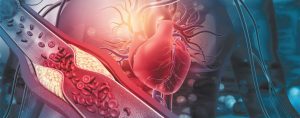 Uncontrolled cholesterol can lead to heart attacks and stroke, but it can also create blockages in the peripheral arteries known as PAD (peripheral arterial disease). Cholesterol is a fatty substance that the body needs, but when it’s in excess, it can begin to build up and leave a sticky substance in the arteries. Uncontrolled, high cholesterol damages the arterial walls, which raises a person’s risk for peripheral arterial disease. Maintaining a healthy diet is critical for keeping your lipid levels in proper balance, coordinately it will assist in supporting the vascular structures through nutrient and antioxidant-dense foods.
Uncontrolled cholesterol can lead to heart attacks and stroke, but it can also create blockages in the peripheral arteries known as PAD (peripheral arterial disease). Cholesterol is a fatty substance that the body needs, but when it’s in excess, it can begin to build up and leave a sticky substance in the arteries. Uncontrolled, high cholesterol damages the arterial walls, which raises a person’s risk for peripheral arterial disease. Maintaining a healthy diet is critical for keeping your lipid levels in proper balance, coordinately it will assist in supporting the vascular structures through nutrient and antioxidant-dense foods.
Know Your Numbers
. Total Cholesterol should be below 200
. LDL should be less than 130
. HDL should be higher than 60
. Triglycerides should be less than 150
Lifestyle choices and changes are incredibly effective at reducing and controlling cholesterol levels. Did you know that losing 10 pounds can significantly reduce your total cholesterol and your LDL by approximately 8%?
Medications: Statins are also the “Gold Standard” for reducing cholesterol. Statins help control the metabolism of serum cholesterol and can reduce the risk of heart attack and stroke. According to the Society for Vascular Surgery, new studies suggest that statins may also reduce plaque that has already accumulated, and it makes it more stable so that it is less likely to break off, form clots and cause strokes or heart attacks.
Diet: Physicians typically, recommend a diet low in saturated fat, full of nutrient-dense fruits, vegetables, lean protein, and healthy fats such as avocados, nuts and cold-water fish. Preventing atherosclerosis, or the hardening of the arteries due to plaque buildup can be achieved through various medications as well. However, if the blockage from PAD is severe and life-threatening, a medical procedure will be necessary to open and repair the artery to allow blood to flow normally again. Nearly 9 million Americans have PAD.
Along with uncontrolled cholesterol, the arteries can become damaged by smoking, high cholesterol, high blood pressure, and insulin resistance (high blood sugar). When this damage occurs, the body begins a healing and regenerative mechanism that allows plaque to act as a bandage over the damaged arterial walls. This is dangerous for multiple reasons, but the two most detrimental are that the plaque can break off, causing a blood clot to form, leading to strokes or embolisms. And the other issue is narrowing of the artery, which blocks blood flow in the legs, arms, brain, and heart. These issues are often linked to unhealthy lifestyles, and PAD can also lead to other complications and comorbidities. Although PAD can happen to anyone, the most common factors that put you at risk are family history, smoking, being overweight, and a sedentary lifestyle.
Because the veins and arteries balance each other out when an individual is experiencing chronic symptoms it’s critical to see a physician. If the veins are damaged, it’s not unusual that the arteries are not pumping blood efficiently either. PAD must be treated to prevent further damage to your circulatory system and your overall health. If you or someone you know is experiencing any venous or arterial issues, please contact your physician immediately.
To schedule an appointment with our boardcertified vascular surgeons, call (239) 344-7061 or visit https://gulfcoastsurgeons.com.
If you or a loved one has any of the venous symptoms or risk factors discussed above, you must seek medical attention immediately. Making an appointment with a vascular surgeon specializing in venous disease is critical.
Call Vascular & Vein Center at Gulfcoast Surgeons today at (239) 344-7061.
877-LEG-PAIN
gulfcoastsurgeons.com
Fort Myers
8010 Summerlin Lakes Dr., Suite 100
Fort Myers, Florida 33907
Cape Coral
1003 Del Prado Blvd., Suite 303
Cape Coral, Florida 33990
Bonita Springs
24301 Walden Center Dr., Suite 102
Bonita Springs, Florida 34134
Source:
https://vascular.org/sites/default/files/CVH_Flyer_English_Link-
nobleed_for_web.pdf










